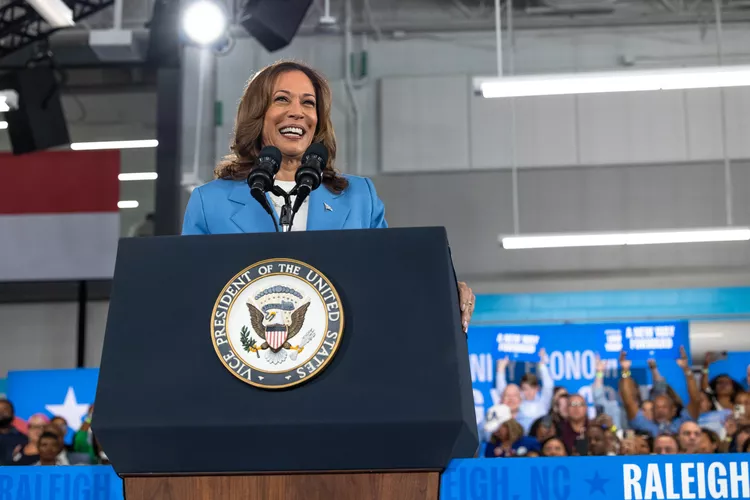KEY TAKEWAYS
- Vice President Kamala Harris laid out her economic agenda Friday, promising tax breaks for middle-class families and to crack down on companies raising rent and grocery prices.
- Many of Harris’s proposals expanded on policies proposed by President Joe Biden.
- Harris’s agenda contrasts with Republican opponent Donald Trump, although the two campaigns have some key policies in common, including expanding the child tax credit and ending taxes on tips.
Vice President Kamala Harris laid out an ambitious economic agenda for her presidential campaign Friday which, much like the policies of President Joe Biden, focuses on reducing key costs of living in the household budgets of middle-class families.
In a speech delivered on the campaign trail in North Carolina Friday, the presumptive Democratic nominee made a series of proposals, many of which took Biden administration policies and pushed them further.
Where Biden had pushed for $25,000 in downpayment assistance for first-generation first-time homebuyers, Harris called for that same amount for first-time buyers regardless of whether their parents owned homes. Where Biden had proposed expanding the child tax credit to a maximum of $3,600 per year per child from $2,000, Harris called for the same, but boosting the amount to $6,000 for newborns. Biden sought to promote affordable housing with a $20 billion fund for local construction, and Harris called for $40 billion.
“For too many people, no matter how much they work, it feels so hard to just be able to get ahead,” she said. “As president, I will be laser-focused on creating opportunities for the middle class that advance their economic security, stability and dignity.”
In her speech and a fact sheet, Harris laid out parts of her economic agenda for the first time, shedding light on where she would continue Biden-era policies, and where she would depart from them.
Harris And Trump Find Common Ground
Harris’s proposals contrasted with those of her Republican opponent, former president Donald Trump. The day before, Trump laid out an economic agenda of his own that was shorter on specifics, repeating several ideas he has proposed in the past, including deporting immigrants, raising tariffs on imported goods, and using the proceeds to pay off the national debt.
The two campaigns also have some policies in common. Earlier in the week, Republican vice presidential nominee, Ohio senator JD Vance, said the Trump campaign would boost the child tax credit to $5,000 per child. And both campaigns have proposed ending income taxes on tips.
Should Harris win the 2024 election and become president, her ideas are still not guaranteed to be implemented, since many would require the support of Congress. Lawmakers are currently divided with Republicans controlling the House of Representatives and Democrats in control of the Senate.
Harris on Housing
Harris proposed a slate of policies aimed at curbing the high cost of housing, which many economists have traced to a long-standing shortage. The affordability situation for both renters and first-time buyers took a turn for the worse starting in 2020 when home prices and rents rose sharply.
Harris’s plan called for the construction of 3 million new houses to close the gap between how many homes exist in the country, and how many are needed, with the aim of evening out supply and demand and putting downward pressure on prices. This would be accomplished by offering tax incentives to builders for constructing starter homes, by funding local construction, and by cutting bureaucratic red tape that slows down construction projects.
She would also help buyers out directly, through the first-time buyer credit.
Harris Promises Corporate Crackdowns
For renters, Harris said she would crack down on companies that own many apartments, who she said have “colluded” to raise rents using pricing algorithms. She also called for a law blocking large investors from buying houses to rent out, a practice she said was driving up prices by competing with individual private buyers.
Harris’s focus on corporate crackdowns extended to the food business, where she called for a “federal ban on price gouging on food and groceries,” without going into specifics about what exact behavior the ban would target.
Harris also said she would have the Federal Trade Commission focus on stopping food companies from merging, a trend that she said has reduced competition and driven up grocery prices.
Lastly, Harris promised to lower costs for prescription drugs, and touted the Biden administration’s success in reducing costs for drugs paid for through Medicare by allowing the government to negotiate with manufacturers. Harris said she would take those efforts further, and would also expand a $35-per-month cap on insulin price, and a $2,000 yearly cap on out-of-pocket drug costs to everyone instead of just seniors.



